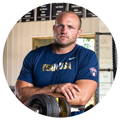Athleticism
What Is Athleticism?
You probably identify as an athlete of some sort. You are in the gym, on the track or field, on the trails or wherever else your sport takes you (that's why you are here, after all). You train hard, you recover hard, you care about being in shape, performing well, and maybe even maintaining a certain physique. So, you are an athlete and would consider yourself athletic.
But have you ever considered your athleticism and what goes into that? Or even how to improve your athleticism? This isn't a question or a topic I see often in the fitness space but one that arguably more athletes and athletic individuals can probably benefit from asking. Why is that?
Because it's one thing to be athletic and call yourself an athlete. However, when you are able to understand athleticism and how to improve it for your sport or goal, you can then find your holes and weaknesses. And yes, this is actually a good thing. Understanding those holes or weaknesses allows you to improve upon them and in turn making you an even better, more well-rounded athlete.
So- what is athleticism? How do you define it? If you were to do a simple google search you would come up with, in my opinion, a very non-answer answer. It's defined as all the characteristics of an athlete. Well…ok but what is that? Let's unpack a few characteristics we believe make a well-rounded athlete. And when all components are put together, improve your athleticism.
Strength
To put it simply, strength is the ability to apply force to an opposing object or into the earth. Strength can be displayed through speed, absolute strength, coordination, and improved jumping ability, to name a few.
Strength is critical in most any sport or athletic endeavor. For most athletic endeavors, being strong is an asset. Some sports are based on strength alone. Being strong is imperative for a sport like Olympic lifting or powerlifting. Your absolute strength is necessary but what can you do with that strength? If you are simply talking “pick things up and put things down” that's cool and all but how does it apply in most athletic endeavors? This is why you need this strength to be functional and applicable to your sport. That being said, at the end of the day, most components of athleticism come back full circle to your strength. Being strong and organizing and utilizing that strength in a specific manner can be foundational to not only being an athlete but improving your athleticism.
Acceleration
How quickly can you get from point A to point B? Your ability to change momentum is what we are talking about here when we refer to acceleration in athleticism. As an athlete, you need the ability to change momentum, to move a certain way using your hard-earned strength. Improving acceleration to be a more well-rounded athlete can be done in the gym through gains in strength. Ultimately, being strong and transferring that strength into speed and acceleration helps you be a more well-rounded athlete at the end of the day.

Explosiveness (Power)
Your ability to use the strength you work hard for both quickly and efficiently in order to exert maximum force in a short amount of time is another component of athleticism. Explosiveness can be found in how you move your body or how you move another object (think barbell or throwing something). Having explosive strength as an athlete is, again, a strength that can be improved upon in the gym but also things like plyometric work can be beneficial here. This is something that can also be considered impulse performance. The force you can develop over a short period of time is an aspect of athleticism that can be improved upon when trying to improve performance. For example, learning how to use your hips as one of your greatest assets, learning how to transfer absolute strength into your body so you have POP when necessary, increases this component of athleticism.

Endurance (Stamina)
Can you sustain a certain level of, often higher intensity effort for a certain period of time? Oftentimes endurance in sport relates to aerobic stamina, in which your heart rate and breathing are both higher. When an athlete has good endurance, you will find them outlasting their opponents, or even a previous version of themselves. To go longer, harder and with less fatigue is the goal.

Mobility (Flexibility)
Being able to reduce the risk of injury sounds nice, doesn't it? Well, when your muscles are able to coordinate themselves so they move a joint through its full range of motion, you are doing just that: reducing your risk of injury by relying on your mobility. Mobility can be beneficial in ways much more than just standing and trying to touch your toes or making sure your lats aren't too tight to throw well. Consider an Olympic lifter going to catch a clean in the deepest squat of their life. That deep squat requires dynamic mobility in order for you to reach the required depth to get under the bar. Improve mobility and you may find yourself improving your sport.
Reflexive Strength (Coordination)
Are you able to arrange your body in a way in which all the parts are working together? When you want your feet to react one way and your arms to do something differently- does your body respond accordingly? What about the challenges that you may come across with having your feet continue to move while your upper body needs to do some other completely different exercise? Are you able to arrange your body and fire your muscles accordingly so you are running while throwing or spinning while pushing? This is your reflexive strength. This plays a role in almost anything in sport. Kick a ball while running, throw while spinning, pull a barbell while dropping into a squat. Coordinating and organizing all these movements at once is a massive component in sport.
Agility (Change of Direction)
Left, right, faster, slower. Your body's ability to change direction on a dime is beneficial. The saying “be light on your feet” comes to mind when thinking of agility. The athlete who can be quicker to pivot from one direction to another with ease and smoothness will often be the more athletic one. If an athlete can identify agility as being one of their areas where improvements are necessary, focusing on dynamic trunk control is critical. The agility component of athleticism requires you to have refined skills in some of these other components we are referring to (balance, strength and mobility) but when you also put an emphasis on dynamic trunk control, you may also find the concept of “being light on your feet” comes a bit easier as well.
Balance
Maintaining control of your body's positioning and maintaining equilibrium, is this even a consideration of yours when you think about being as athletic as possible? Your balance plays a key role in everything. Squatting, pulling, jumping and even in the specific sport you are training for, without balance you are in trouble. Improving your balance often means improving your dynamic trunk control as well. And while we know that having a strong trunk can translate into being a strong athlete so you might not need much convincing to work on this, knowing that balance improves as well is only icing on the cake.
Mental Resilience
You lose, you make a bad play, things don't work out as you had planned or hoped- how do you deal? Are you able to bounce back and take the next best step? Or does something that doesn't go according to plan get in your head and totally derail you? It may not even be fair to say this is easier for a seasoned athlete, because that's not always the case. Rather the person who is able to understand that bad days, losses, they unfortunately happen but the next best thing you can do is learn from it and move on. Asking yourself “what can I learn from this, how can I take this into my training to perform better in the future?” is where your mental resilience can be a major athlete in athleticism.

Strategic Thinking
What's the next best move? Often in sport you need to make important decisions, and often on the fly. It's not just a matter of “throw the ball” or “lift the weight” rather, how can you do it in the most efficient and effective manner given the specific circumstances you are performing under. Going up against an opponent, tripping mid sprint or some other unforeseen circumstance occurs, and you are forced to keep going, being able to strategically make the next move is key in sports performance.
Now that we understand what makes up athleticism, it's probably easier to see and understand how being athletic in itself isn't enough. Even the most genetically blessed humans who seem to just “have it” can benefit from understanding each of these components and identifying where they need to improve upon the most for their specific sport. Someone who is naturally strong, we love that for them, however not being able to translate that strength with quick thinking and organizing their body to move in a way they want with ease, rather than looking like a baby giraffe trying to walk, takes training and practice.

Improving Athleticism
The demands of different sports need to be taken into consideration when trying to find peak athleticism. The requirements needed to be the best swimmer possible will be dramatically different than a football player or even Olympic lifter. Where a swimmer might want to put more emphasis on endurance, a football player or Olympic lifter might put a focus on reflexive strength and agility. Both athletes can chase peak athleticism but their specific areas of focus in training will vary. Because of this, when trying to improve your athleticism you need to first understand what your sport needs most then identify where you are specifically lacking. If you are particularly deficient in one area, you can devote more training time to that area in order to see improvements.
It's worth noting that putting too much of a focus on specializing can actually decrease your athleticism. Say, for example, you put a huge emphasis on getting strong, you will likely notice your endurance suffers. With proper training, we understand that different cycles will have different areas of focus. But in this example, because of trying to specialize, the overall athleticism of this athlete will decrease. So, it is important for you, the unique individual, to have seasons of training where the focus can be more specialized but with a broader purpose of improving your sport and athletic ability appropriately.


Gaylemarie Kayes
Gaylemarie, but just call her GM, is a seasoned fitness and nutrition professional with nearly two decades of experience in the industry. With a diverse clientele ranging from ultra runners to high-level competitors, gm brings a wealth of knowledge and expertise. As a former high-level athlete in running, CrossFit and Olympic lifting to now, a busy yet active mother, she understands the challenges of balancing fitness and goal getting with a hectic lifestyle. Gm's approach emphasizes discipline, ownership, and hard work, tailored to honor each individual's life season for optimal health and well-being.
Blog Topics

Yo, It's Dane
Welcome to the Garage Strength Blog, where it is my goal to provide you with the experience and knowledge I've gained in the strength and conditioning world over many years of learning from both successes and failures. I train elite-level athletes in a multitude of sports from the high school to professional levels, already producing 5 Olympics and 30+ National Champions. If you want to be the next champion I train, check out my strength programs below!
Start Training With Me

Join for free educational videos EVERY WEEK on strength coaching and athletic performance

